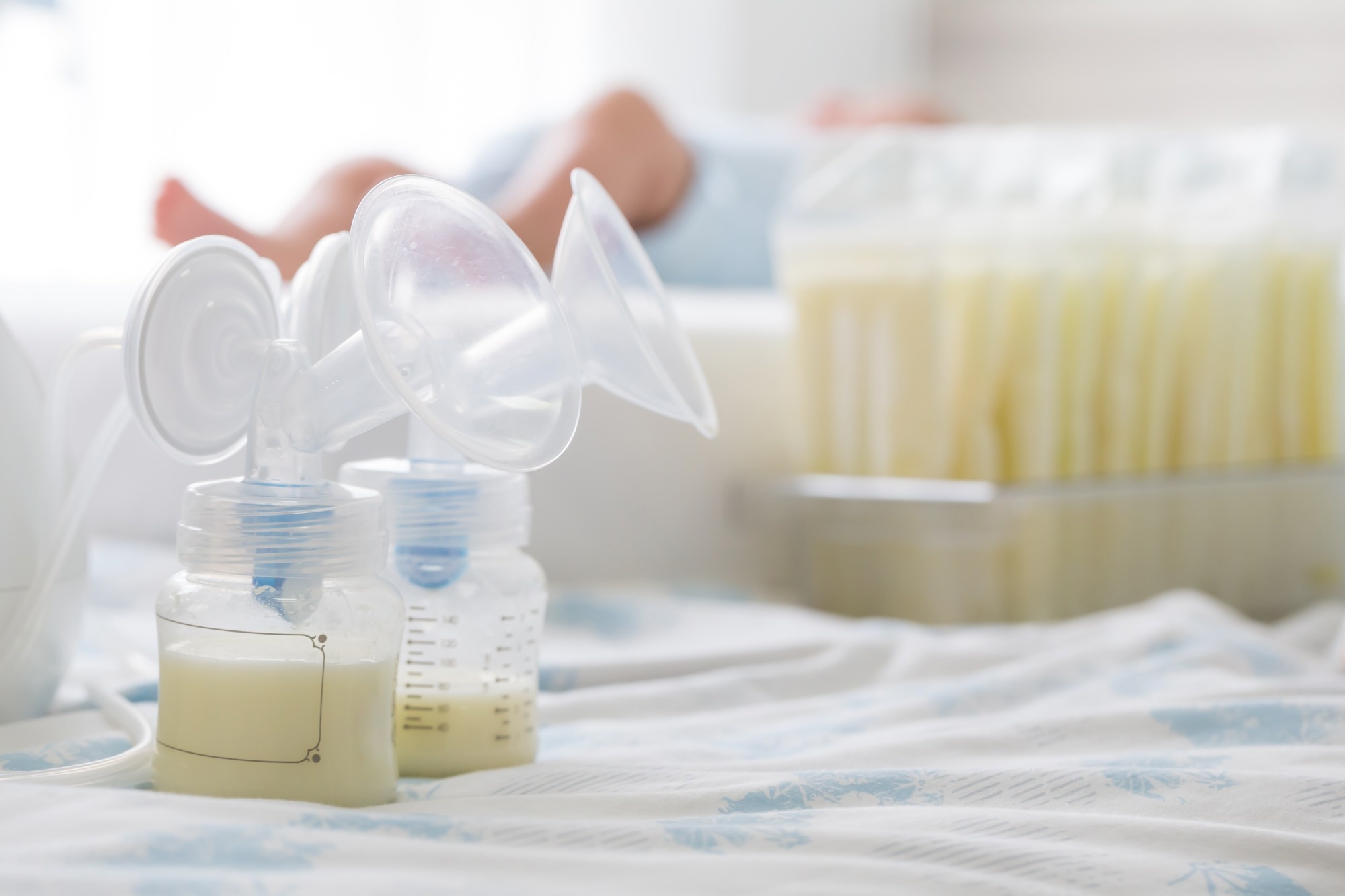In a recent study posted to the Research Square* preprint server, researchers in Hong Kong examined the presence of antibodies directed against the severe acute respiratory syndrome coronavirus 2 (SARS-CoV-2) following vaccination in human breast milk and how these levels correlate to breast milk microbiota composition.
 Study: COVID-19 mRNA vaccine-mediated antibodies in human breast milk and their association with breast milk microbiota composition. Image Credit: comzeal images / Shutterstock.com
Study: COVID-19 mRNA vaccine-mediated antibodies in human breast milk and their association with breast milk microbiota composition. Image Credit: comzeal images / Shutterstock.com

 *Important notice: Research Square publishes preliminary scientific reports that are not peer-reviewed and, therefore, should not be regarded as conclusive, guide clinical practice/health-related behavior, or treated as established information.
*Important notice: Research Square publishes preliminary scientific reports that are not peer-reviewed and, therefore, should not be regarded as conclusive, guide clinical practice/health-related behavior, or treated as established information.
Protecting newborns against COVID-19
The coronavirus disease 2019 (COVID-19) continues to be a global threat to public health due to the emergence of highly transmissible and immune-evasive SARS-CoV-2 variants. Unvaccinated children, such as newborns under six months of age, are particularly vulnerable to the effects of these variants.
As a result, health agencies worldwide recommend that pregnant women and breastfeeding get vaccinated against SARS-CoV-2 to protect themselves and their infants. Following vaccination, SARS-CoV-2-specific antibodies can be detected in breast milk and infant stool.
In addition to conferring protection to the infant against harmful pathogens, breastfeeding also has a vital role in establishing and maintaining the infant’s gut microbiome. The early-life gut microbiome has long-term effects on health, particularly in the development of B- and T-cell immunity.
To date, it remains unclear how changes in the breast milk microbiota after vaccination, if any, may affect the immune response to COVID-19.
About the study
Lactating mothers who intended to receive the BNT162b2 messenger ribonucleic acid (mRNA) vaccine and tested negative for COVID-19 before receiving the vaccine were eligible to participate in the current study. Thereafter, the study participants collected breast milk at their homes using sterile milk bags at four different time points. Self-administered questionnaires were used to gather information on demographic and lifestyle factors such as age, educational level, and breastfeeding habits at each time point.
SARS-CoV-2 spike protein-specific immunoglobulin A (IgA) and IgG antibodies were measured to evaluate immune responses to the BNT162b2 vaccine at various stages of the vaccination schedule. Deoxyribonucleic acid (DNA) was extracted from breast milk to analyze its microbiota, whereas 16S recombinant RNA amplicon sequencing was used to investigate the potential correlation between microbiome composition and concentration of vaccine-induced anti-receptor-binding domain (RBD) antibodies present in breast milk. The microbial composition and diversity of breast milk samples were also assessed at various time intervals.
Study findings
A total of 175 samples from 44 participants were selected for downstream analyses after excluding specimens without available sequencing data. The study included lactating mothers between 25 and 42 years of age, with a median age of about 36.
SARS-CoV-2 spike protein-specific IgA and IgG levels in breast milk samples were comparable to baseline levels prior to vaccination. One week after the second vaccine dose, IgA and IgG levels increased to an interquartile range (IQR) of 0.198 and 0.216, respectively, as compared to 0.116 and 0.058, respectively.
By one month following receipt of the second dose, IgA levels returned to baseline, whereas IgG levels remained significantly higher as compared to baseline. Interestingly, mothers who had epidural anesthesia during delivery had lower IgA levels one week after receiving the second vaccine dose.
A significant increase in bacterial Chao1 richness in breast milk samples was observed one week following receipt of the first vaccine dose as compared to baseline values; however, no significant change in Shannon diversity was observed at this time point. One week after the second dose, microbiome richness returned to baseline levels.
Notably, a consistent decline in Chao1 diversity over time was observed. Beta diversity also significantly changed upon comparing the composition of pre-vaccination breast milk samples to all samples obtained after receiving the second vaccine dose.
A total of 109 differentially abundant species were identified in breast milk samples between pre- and post-vaccination time points, ten of which remained abundant throughout the study period. Notably, 53 species, including Anaerococcus octaviu, Arthrobacter russicus, Bacteroides caecimuris, Clostridiaceae bacterium, Helicobacter rodentium, Lactobacillus aviarius, and Rothia sp., were differentially abundant when baseline levels were compared to those observed following the second vaccine dose. Furthermore, levels of the 12 most abundant species varied across all samples and time points.
The researchers then investigated any correlations that might exist between microbiome composition and anti-SARS-CoV-2 antibodies in breast milk before and after COVID-19 vaccination. To this end, no significant difference in Chao1 richness and beta diversity with respect to baseline microbiota between participants with low- and high levels of IgA was observed, whereas Shannon richness was higher in high-IgA subjects as compared to low-IgA subjects.
Furthermore, low-IgA samples exhibited a higher relative abundance of Firmicutes at 74.62% as compared to 61.78% detected in the high-IgA group. Comparatively, Proteobacteria levels were lower in the low-IgA group at 9.01% compared to 18.64% in the high-IgA group.
Conclusions
Significant changes in the microbiota of breast milk were observed following BNT162b2 vaccination, with many abundances correlating with anti-SARS-CoV-2 antibody levels. Since many of these species, such as Neisseria sp., are immunomodulatory, vaccination of lactating mothers against COVID-19 may directly protect infants against infection through the transmission of both antibodies and beneficial microorganisms.

 *Important notice: Research Square publishes preliminary scientific reports that are not peer-reviewed and, therefore, should not be regarded as conclusive, guide clinical practice/health-related behavior, or treated as established information.
*Important notice: Research Square publishes preliminary scientific reports that are not peer-reviewed and, therefore, should not be regarded as conclusive, guide clinical practice/health-related behavior, or treated as established information.

